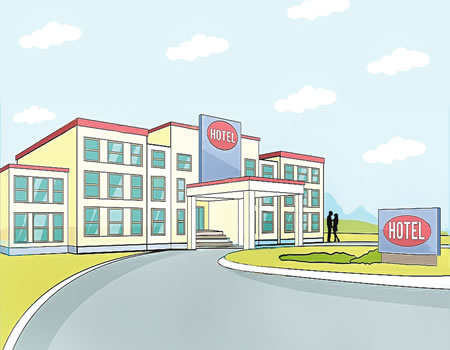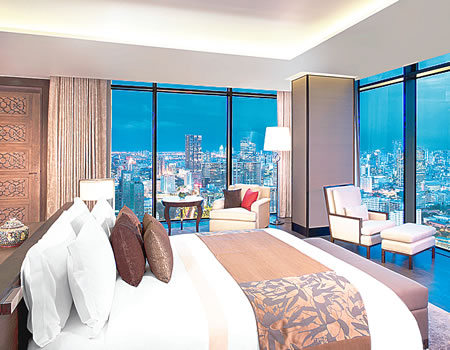YUSUF (surname withheld) is a graduate. Having written several applications for employment and walked the streets of Lagos searching for non-existent white-collar jobs, he eventually settled for a casual job in a five-star hotel in Lagos. With a sigh of relief, joy and high hopes, Yusuf announced his “good fortune” to all who cared to listen. He was sure of an average salary, excellent daily meal and possibly rich leftovers to take home from time to time. He was in a dreamland.
Five-star disappointment
Five-star hotels are known for tasty, assorted meals and highly priced rooms that are just right for the affluent. In Nigeria, such hotels come at particularly high costs due to the high volume of inbound business travel connected with the oil industry, plus security concerns which prompt travellers’ preference for five-star accommodation.
However, given the high level of unemployment in Nigeria, one would expect that getting a job in such five-star hotels would be a dream come true. Many suppose that such a job comes with attractive salary, glamour, allowances, generous meals and other off-record benefits. But interestingly, reverse is the case, especially for casual workers.
Investigations reveal that casual workers in most of the top hotels in Lagos receive as little as N1,000 (a little above $2) per day and are allowed to work for 20 days a month. This means that a casual worker in a typical hotel receives N20,000 per month.
Labour leader justifies ‘treatment’
The Acting General Secretary, National Union of Hotels and Personal Service Workers (NUHPSW), Mr Gbenga Ishola, however, explained the different layers of employment in the sector. According to him, an employee can be a permanent, contract or ad-hoc staff. He added that ad-hoc staff members in such hotels are rightly paid per day, trained and always considered where there are openings, in view of their experience.
He was not forthcoming on whether N1,000 was a right amount to pay to such ad-hoc staff. Extant labour laws won’t also support his claim.
It was deduced from the provisions of the Labour Act, the Employee’s Compensation Act 2011, the Pension Reforms Act 2014, the Trade Unions Act 1973, the Industrial Training Fund (Amendment) Act 2011 and other similar legislations on labour or employment Law, describes a worker or employee as any person who is employed in the public or the private sector of the economy, to carry out some function relating to the employer’s business, whether on a temporary or causal or ad-hoc basis, for a period of not less than thirty (30) days. The provisions added that the contract of employment could be oral or in writing; express or implied; continuous or part-time.
No food for hard-working staff
A knowledgeable source in a five-star hotel, considered as one of the most prominent and patronised on Lagos Island, precisely around Victoria Island, revealed that casual workers in the hotel have retained their status for more than five years.
The source, who presented his identity card to prove he truly worked in the hotel in question but declined to have his name mentioned, claimed that customers often do not consume all the meals they buy. So, he said, what the waiters and waitresses do is to eat as much as they can from the leftovers and throw away the remnants.
According to him, due to huge quantity of food being thrown away, waste disposal officials come every day to evacuate them. He alleged that the waste is actually not the remnants of foods from the plates of customers but those that were not yet dished by customers.
“For example, the head of a big fish contains so much flesh. But the rule is that chefs must dispose of the head and use only the flesh for certain meals. When the waste disposal men come, they gather all those big fish heads in clean bags, separate them from the normal waste bins and take them away.
“If not for the small tips from generous customers and sometimes the meal that we eat at work, a casual worker’s take-home pay cannot even take him home. Actually, treatment of temporary staff is bad and encourages sharp practices that may not be known to the top management. Some casual workers have remained casual workers for seven years. If there is a promotion, it is based on favouritism, not merit. It was only recently that an Italian woman came and flushed out most of the people employed through favouritism and got new people to work with her.
“The only temporary workers that get N2,000 daily are the girls that the management engage for ushering from some higher institutions in Lagos whenever we have a chain of events, especially on weekends,” the source said.
According to him, the management of the hotel has directed that salaries be paid through the bank but the casual workers never receive their pay until around the end of a succeeding month. “They will get our salaries and keep in their bank accounts to get interests on them until we protest. It was just in July that we were asked to open salary accounts. The management of the hotel had expressed dissatisfaction with ‘the embarrassing queues’ of casual workers for the collection of their salaries by hand,” he added.
Smuggling unlimited
Although casual workers do not take food or drinks away, some employees know how to go about it, especially as regards drinks.
The Saturday Tribune’s source said, “If you attend a party organised by a staff member of any five-star hotel, you will find assorted foreign wines and you will drink to your fill. They know how the unsold drinks get out of the hotel without the books showing or the management knowing.”
When contacted, a senior executive of one of the top-quality hotels in Victoria Island spoke on the condition of anonymity. He said in any organisation, all employees do not earn the same salary. At his hotel, he explained, some workers earn N30,000, some, N35,000 and others, N40,000, plus service charge, which is often added to the salary as a share of profit from higher sales. According to him, this service charge is paid most times in the middle of the month.
“We actually pay staff twice a month. For instance, some staff earned N85,000 as service charge in July. If you are earning N30,000 as basic salary and N85,000 is added to it, you have at least N115,000 for a particular month and this varies. The temporary workers do not benefit from the service charge,” the source disclosed.
On disposal of leftover foods that are still good for consumption, he said the management allowed workers to eat and take home from such until it was allegedly discovered that they were stealing meals and other food items from the kitchen and claiming they were all remnants from customers’ meals.
At another hotel located on the Island, believed to be owned by a former governor, a worker admitted that casual workers still existed but refused to reveal details of their pay. A waitress who reluctantly spoke to Saturday Tribune said “the only information I can give you is that there are temporary workers and the hotel’s rates fluctuate and are driven by demand and exchange.”
Checks with another highly rated hotel on the Mainland could not reveal whether casualisation of workers was also a management policy there. A staff member claimed there was no such practice there.
Security implications
A certain high-profile individual, who is the chief executive of one of the domestic airlines at the Murtala Muhammed International Airport, Lagos, is known to patronise five-star hotels. The man, who refused to be quoted, criticised owners of hotels who still engage staff on casual basis despite the huge profits they make.
According to him, the owners of such hotels should realise that most of their young employees are university graduates who are professionals in the hotel business. The managing director, who claimed to patronise some of the big hotels on the Islands for business meetings, said it never occurred to him that the young employees there were casual workers whose daily take home pay was as low as N1,000.
While describing the owners of the affected hotels as slave masters, he challenged the labour unions to prevail on the ministry of labour to correct the alleged exploitative attitude.
Another customer who claimed that his organisation uses one of the top-quality hotels for breakfast forum, said his company paid N1 million per meeting and as the event ended, other companies took over. Going by this, he expressed the belief that the average big hotel with good sales return should remunerate their workers well, irrespective of category.
“It is not surprising to know that workers are not allowed to take food home. Even in ordinary restaurants in town, no worker is allowed to take food home. However, regarding casualisation, you know that in any establishment owned by (nationality withheld), workers are paid miserly salaries. I am aware that under the labour law, casualisation should not exceed six months, but if you trace the history of (nationality withheld) or even other Asian companies in Nigeria, the story has always been the same. I have heard that salaries in the hotels are low, but I am not very sure of the N1,000 pay for casual workers in (identity withheld) hotels,” he said.
He said further that the alleged maltreatment of casual workers was because some “employers of labour are under the ‘business perception’ that expenditures for casual, undocumented employees are cheaper than those for documented permanent employees. But is this business ‘perception’ supported by the existing labour laws and regulations?”
Labour reacts
Speaking with Saturday Tribune, the Acting General Secretary, National Union of Hotels and Personal Service Workers (NUHPSW), Mr Ishola, stated that those mentioned must be ad-hoc staff.
“Whenever there are not enough hands, they engage them. They are not staff, they are not outsourced and they are not even contract staff. What usually is the case is that they are called upon when there is the need for more hands, maybe when the hotels have special events like shows or conferences. The staff members have letters of engagement and contractual agreement with which the hotel workers’ union always ensures compliance. More so, these ad-hoc staff members are usually paid per day. They are usually trained and are always considered whenever there are openings in hotels because of their experience,” Ishola said.
What the law says
The Labour Act reiterates the old Common Law principle which makes employers indirectly or vicariously liable for all their employees’ misfeasance or wrongdoing undertaken in the course of their employment, whether such employees are on full-time or part-time employment.
In addition to casual employees having legal rights to be given written contracts of employments, to enjoy break-time, have regularity in the payment of their wages and take maternity leave, all employees in Nigeria, including casual employees, are also entitled to earn the minimum wage as guaranteed under the National Minimum Wage (Amendment) Act 2011. The national minimum wage in Nigeria is N18,000 per month.
Under the Pension Reforms Act 2014, all employees, whether on full-time or part-time basis, are entitled to enjoy the benefits under the Contributory Pension Scheme. This is confirmed in a recent article published by the legal practitioners at a renowned law firm.
In addition to pension benefits, the estate of a deceased employee is also entitled to enjoy the benefits which accrue from the mandatory Group Life Insurance Policy, which the Pension Reform Act 2014 requires all employers to take out on behalf of their employees.
You May Also Like:





